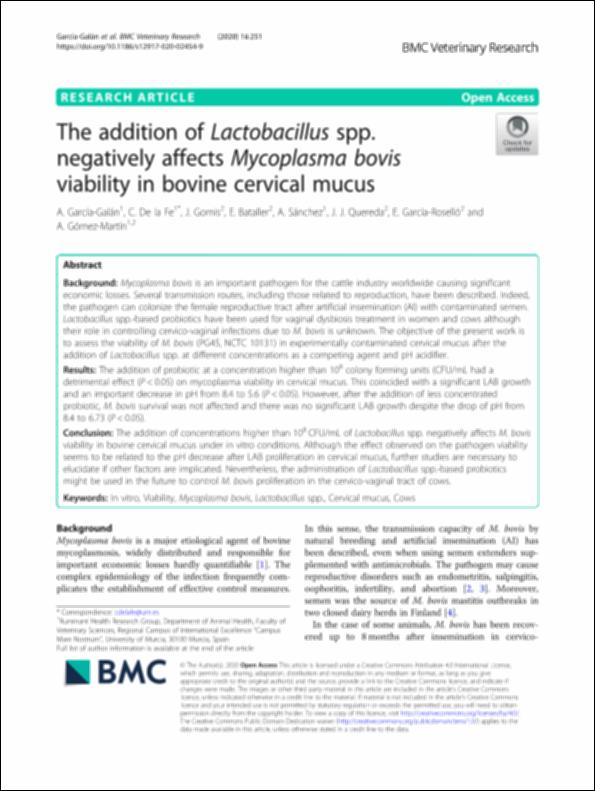Please use this identifier to cite or link to this item:
http://hdl.handle.net/10637/12580The addition of "Lactobacillus spp." negatively affects "Mycoplasma bovis" viability in bovine cervical mucus
| Title: | The addition of "Lactobacillus spp." negatively affects "Mycoplasma bovis" viability in bovine cervical mucus |
| Authors : | García Galán, Ana Fe Rodríguez, Christian de la Gomis Almendro, Jesús Bataller Leiva, Esther Sánchez López, Antonio Quereda Torres, Juan José García Roselló, Empar Gómez Martín, Ángel |
| Keywords: | Cattle - Reproductive technology.; Esperma.; Cattle - Bacteriology.; Lactobacillus.; Antibióticos en veterinaria.; Antibiotics in veterinary medicine.; Reproductive technologie in animals.; Reproducción asistida en los animales.; Ganado vacuno - Reproducción asistida.; Bacteriología veterinaria.; Veterinary bacteriology.; Ganado vacuno - Bacteriología.; Micoplasmosis en los animales.; Mycoplasma diseases in animals.; Lactobacilos.; Spermatozoa. |
| Publisher: | BioMed Central. |
| Citation: | García-Galán, A., De la Fe, C., Gomis, J., Bataller, E., Sánchez, A., Quereda, J.J. et al. (2020). The addition of "Lactobacillus spp." negatively affects "Mycoplasma bovis" viability in bovine cervical mucus. BMC Veterinary Research, vol. 16, art. 251 (20 jul.). DOI: https://doi.org/10.1186/s12917-020-02454-9 |
| Abstract: | Background: Mycoplasma bovis is an important pathogen for the cattle industry worldwide causing significant economic losses. Several transmission routes, including those related to reproduction, have been described. Indeed, the pathogen can colonize the female reproductive tract after artificial insemination (AI) with contaminated semen. Lactobacillus spp.-based probiotics have been used for vaginal dysbiosis treatment in women and cows although their role in controlling cervico-vaginal infections due to M. bovis is unknown. The objective of the present work is to assess the viability of M. bovis (PG45, NCTC 10131) in experimentally contaminated cervical mucus after the addition of Lactobacillus spp. at different concentrations as a competing agent and pH acidifier. Results: The addition of probiotic at a concentration higher than 108 colony forming units (CFU/mL had a detrimental effect (P < 0.05) on mycoplasma viability in cervical mucus. This coincided with a significant LAB growth and an important decrease in pH from 8.4 to 5.6 (P < 0.05). However, after the addition of less concentrated probiotic, M. bovis survival was not affected and there was no significant LAB growth despite the drop of pH from 8.4 to 6.73 (P < 0.05). Conclusion: The addition of concentrations higher than 108 CFU/mL of Lactobacillus spp. negatively affects M. bovis viability in bovine cervical mucus under in vitro conditions. Although the effect observed on the pathogen viability seems to be related to the pH decrease after LAB proliferation in cervical mucus, further studies are necessary to elucidate if other factors are implicated. Nevertheless, the administration of Lactobacillus spp.-based probiotics might be used in the future to control M. bovis proliferation in the cervico-vaginal tract of cows. |
| Description: | Este artículo se encuentra disponible en la siguiente URL: https://bmcvetres.biomedcentral.com/articles/10.1186/s12917-020-02454-9 |
| URI: | http://hdl.handle.net/10637/12580 |
| Rights : | http://creativecommons.org/licenses/by/4.0/deed.es |
| ISSN: | 1746-6148 (Electrónico). |
| Issue Date: | 20-Jul-2020 |
| Center : | Universidad Cardenal Herrera-CEU |
| Appears in Collections: | Dpto. Producción y Sanidad Animal, Salud Pública Veterinaria y Ciencia y Tecnología de los Alimentos |
Items in DSpace are protected by copyright, with all rights reserved, unless otherwise indicated.


